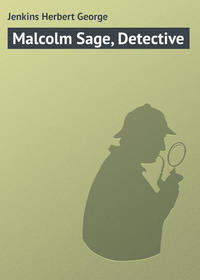
John Dene of Toronto: A Comedy of Whitehall
"That's it!" he exclaimed at last.
Dorothy continued to regard him in wonder. Something of vital importance must have happened, she decided, to produce this effect on a man of John Dene's character.
"It's – it's not the Destroyer" she cried breathlessly at last. "Nothing has happened?"
John Dene shook his head vigorously, and continued his "prancing."
"Then what – " began Dorothy.
"Listen," he said. "I've never had any use for women," he began, then stopped suddenly and stood looking straight at her.
Dorothy groaned inwardly, convinced that she was about to be dismissed. In a flash there surged through her mind all that this would mean. She might be taken on again by the Admiralty; but at less than half her present salary. It was really rather bad luck, she told herself, when the extra money meant so much to her, and she really had tried to be worth it.
"You see, I don't understand them."
The remark broke in upon her thoughts as something almost silly in its irrelevancy. Again she looked up at him as he stood before her rather as if expecting rebuke. Again he span round and continued his pacing of the room.
As he walked he threw staccatoed remarks from him rather than directed them at Dorothy.
"There's nothing wrong with the Destroyer. When you're after one thing you don't seem to notice all the other things buzzing around. One day you wake up to find out that you've been missing things. I've been telling myself all the time that some things didn't matter, but they do."
He paused in front of Dorothy, expressing the last three words with almost savage emphasis.
"There's never been anybody except Jim – and the boys," he added, "until your mother was – " He stopped dead, then a moment later continued: "I'd like her to know." To Dorothy his voice seemed a little husky. "May be it'ud please her to think that she had – you see I'm telling you the whole shooting-match," he blurted out as he resumed his restless pacing up and down.
"But that's just what you're not doing," said Dorothy. "I don't in the least understand what you mean, and – Oh, I wish you could stand still, if only for a minute."
Instantly John Dene stopped in his walk, and stood in the middle of the room looking over Dorothy's head.
"I'm trying to ask you to marry me, only I haven't got the sand to do it," he blurted out almost angrily.
"Oh!" Dorothy's hands slipped into her lap, her eyes widened and her lips parted, as she looked up at him utterly dumbfounded.
"There, I knew what it would mean," he said, as he continued his pacing. "What have I got to offer? Look at me. I'm not good-looking. My clothes are not right. I don't wear them properly. I can't say pretty things. The best I can do is to buy flowers and chocolates and express them. I daren't even hand them to you. Oh, I've thought it all over. What use am I to a woman?" Then as an after-thought he added, "to a girl?" He turned and paced away from Dorothy without looking at her.
"Oh, shucks!"
John Dene swung round on his heel as if he had been struck. His jaw dropped, his cigar fell from his mouth, and he looked at her as if she had said the most surprising thing he had ever heard.
"I said 'shucks'" she repeated. Her eyelids flickered a little and she was unusually pale.
"You mean – " His voice was far from steady.
"I mean," said Dorothy quietly, "that a man who could invent the Destroyer ought to be able to learn how to talk to – to – be nice to a girl." The last five words came tumbling over each other, as if she had found great difficulty in uttering them, and then had thrown them all out at one time.
"Say," he began, hope shining from his eyes. Then he stopped abruptly and walked over to his chair, throwing himself into it with a sigh. "You mean."
"Perhaps," said Dorothy, dropping her eyes and playing about with a fastening on her blouse, "I might be able to help you." Then after a pause she added, "You know you got me a rise."
And then John Dene smiled. "Say, this is great," he cried. "I – I – " Then suddenly he jumped up, dashed for his hat and made for the door. As he opened it he threw over his shoulder:
"We'll start right in to-morrow. I'm through with work for to-day. I'll be over to-night."
Then suddenly Dorothy laughed. "Was ever maid so wooed?" she murmured. "But – " and she left it at that.
As she thrust the pins into her hat, she decided that John Dene had been right. It would have been awkward to – to – well, to do anything but go home.
Just as she was about to lock the outer door of the office, she had an inspiration. Returning to her table she removed her gloves and, after a few minutes' thought and reference to the London Directory, she sat down to her typewriter and for a few minutes her fingers moved busily over the keys.
With a determined air she pulled the sheet from the clips and read: —
"JOHN DENE OF TORONTO. Lesson 1.
Tailors.. Pond and Co., 130 Sackville Street.
Hosiers.. Tye Brothers, 320 Jermyn Street.
Bootmakers. Ease & Treadwell, 630 Bond Street.
Hatters.. Messrs. Bincoln and Lennet, Piccadilly.
When a man knows his job, let him do it and don't butt in."
With a determined little nod of approval, she folded the sheet of paper, inserted it in an envelope, which she addressed to "John Dene, Esq., The Ritzton Hotel, S.W. Immediate," and left the office.
"I wonder what you would think of that, mother mine," she murmured as she left the hotel, after having given strict injunctions that the note be handed to John Dene immediately he returned.
CHAPTER XXI
MARJORIE ROGERS PAYS A CALL
"Well, mother darling," cried Dorothy, as she jerked the pins into her hat, "you've lost the odd trick."
"The odd trick!" repeated Mrs. West, looking up with a smile into her daughter's flushed and happy face. "What odd trick?"
"John Dene of Toronto. Whoop! I want to jazz. I wonder if he jazzes;" then, with a sudden change of mood she dropped down beside her mother's chair and buried her face in her lap. When she looked up her eyes were wet with tears. "Mother, darling, I'm so happy." She smiled a rainbow smile.
"What did you mean about the odd trick, dear?" enquired Mrs. West greatly puzzled, accustomed as she was to her daughter's rapid change of mood.
"John Dene's the odd trick," she repeated, "and I'm going to marry him." Again she hid her face.
"Dorothy!"
"I am, mother, really and really." She looked up for a moment, then once more she buried her face in her mother's lap.
"Dorothy dear, what do you mean?"
"Oh! he was so funny when he proposed," gurgled Dorothy, "and I just said 'shucks.' That seemed to please him."
"Dorothy dear, are you joking?"
"Not unless John Dene's a joke, mother dear," she replied. "Wouldn't it be funny to call him Jack?" Then she told her mother of the happenings of the afternoon.
"Please say you're glad," she said a little wistfully.
"I'm – I'm so surprised, dear," said Mrs. West, stroking her daughter's head gently; "but I'm glad, very glad."
"I thought you would be, and I shall be Lady Dene. Everybody at the Admiralty says he'll get a title, and you'll have to say to the servants, 'Is her ladyship at home?' You won't forget, mother, will you?" She looked up with mock anxiety into her mother's face.
Mrs. West smiled down at Dorothy; her eyes too were wet.
"But oh! there's such a lot of spade work to be done," continued Dorothy. "I shall begin with his boots."
"His boots!"
"They're so dreadful, mother. They're all built up in front as if they were made to kick with, and when I marry him, if there's any kicking to be done, I'm going to do it."
"Of course you realise, dear, that he's much older than you," said Mrs. West hesitatingly.
"He's a perfect baby-in-arms compared with me," she smiled at her mother, a quaint confident little smile.
"But you're sure that – that – " Mrs. West hesitated.
Dorothy nodded her head violently.
"When – " began Mrs. West.
"It – it was when he disappeared," she said with averted face. "I – I seemed to miss him so much. Oh! but mother," she cried, clasping her mother's knee, "he's so funny, and really he wants someone to look after him. You see," she continued slowly, gazing away from her mother, "it's always difficult to – What made you love – care for father?" she corrected.
"He was your father, dear."
"Yes; but he wasn't before you married him."
"Dear, you – " began Mrs. West, a flush of embarrassment mounting to her cheeks.
"Own up, mother, that you don't know. You can't say it was the shape of his nose, or the way he ate, or his chest measurement."
"Dorothy! why will you never be serious?" protested Mrs. West.
"I can't, mother," cried Dorothy, jumping up and walking over to the window. "No girl ever really knows why she wants to marry a man," she remarked, gazing out of the window. "It's just a feeling. I've got a feeling that I want to take care of John Dene, and – and – oh, mother! see to his boots," she finished with a laugh.
"I like Mr. Dene, Dorothy," said Mrs. West with a decisiveness that was with her uncommon.
"I know you do," said Dorothy mischievously. "That's what I'm afraid of."
"Dorothy dear, you mustn't," began Mrs. West.
"And," continued Dorothy relentlessly, "I won't have any poaching. I don't mind his being nice to you," she continued, leaving the window and planting herself in front of her mother, "because you really are rather nice." She tilted her head on one side, a picture of impudence. "Now, Mrs. West," she said, "the sooner we understand each other the better."
Again she was back on the stool at her mother's feet. For some minutes there was silence.
"Mother!" She looked up with grave and serious eyes.
"Yes, dear."
"I always prayed for – for him to come back. I – I – Oh bother!" as the bell rang.
"I wonder who that is. We won't answer it."
"But we must, dear," expostulated Mrs. West. "It might be a friend."
"Oh, well," cried Dorothy, getting up and going out into the tiny hall. A moment later she re-entered, followed by Marjorie Rogers. "It's Marjorie, mother."
Mrs. West smiled up at her as the girl bent to kiss her.
"I've come to know," began Marjorie, then she hesitated.
"To know what?" asked Dorothy.
"If it's all right."
"If what's all right?"
"J. D."
"What do you mean, Rojjie?" cried Dorothy, blushing.
"Did he propose? You know I ran in this afternoon and gave him a hint."
"You what?" cried Dorothy aghast.
"Oh! I just gave him a sort of hint that he was – "
"You wretched little creature!" cried Dorothy, seizing Marjorie and shaking her vigorously. There was a look in her eyes that half frightened the girl.
"Help! Oh, Mrs. West!" cried Marjorie, "she's killing me."
"What did you say to him?" demanded Dorothy fiercely.
"I just gave him a hint," repeated Marjorie airily. "I knew he was in love with you."
"What did you say to him?" Again Dorothy shook her.
"Oh, Wessie, if you do that you'll shake all my hair off, not to speak of my teeth. All I said was that you had wasted away when he was lost, and mind, you've got to ask me down to your place, wherever it is, because it's all through me. Oughtn't she, Mrs. West?" she appealed.
Mrs. West smiled a little uncertainly.
"Marjorie, you're a pig," cried Dorothy, "and I don't believe you did go and see him."
"Oh! didn't I, then why do you suppose I've got my new stockings on?" she cried, lifting her skirts.
"Children, children," smiled Mrs. West.
"My chief says he'll be made a baronet, so that'll be all right for the kids," said Marjorie.
"Rojjie!" cried Dorothy in confusion, and a moment later she had rushed from the room.
When Dorothy returned to the little drawing-room a quarter of an hour later, she found that Marjorie had accepted Mrs. West's invitation to stay to dinner.
"Is he going to call this evening?" she asked eagerly.
"Don't be inquisitive," cried Dorothy, conscious that she was blushing.
"You're in love with him, Dorothy, aren't you?" persisted Marjorie.
"Oh, mother, please tread on this horrid little creature," cried Dorothy; but Mrs. West merely smiled.
"You know," continued Marjorie candidly, "he's not much to look at; but he beats all those boys at the Admiralty." She shrugged her shoulders indifferently. "It's nothing but chocolates, lunches and dinners, and take it out in kisses."
"My dear," said Mrs. West with quiet dignity, "you mustn't talk like that."
"I'm so sorry," cried Marjorie contritely; "but you know I get so fed up, Mrs. West. John Dene's so different. If it hadn't have been for Dorothy, I should have tried to get him for myself. I could," she added, looking from one to the other.
"You could probably get anything in the world except what you most wanted, Rojjie," said Dorothy sweetly.
"What I most wanted," repeated the girl.
"Yes, dear, a good spanking."
Marjorie made a face at her. Suddenly she jumped up from the table, and throwing her arms round Dorothy, kissed her impulsively, then a moment later she returned to her seat, a little shamefacedly as Dorothy and Mrs. West smiled across at her.
"I know you think I'm a feather-headed little cat, Mrs. West," said Marjorie wisely. "No, don't deny it," she persisted, as Mrs. West made a movement as if to speak. "But I'm not worldly all through, really, and I do like John Dene, and of course I just love Dollikins," she said with a quaint little smile in Dorothy's direction. "Would you sooner I went?" she asked, looking from one to the other.
"Sooner you went?"
"Yes, after dinner, I know that John Dene's coming to-night, although Dorothy won't own up."
"We shouldn't let you go, should we, mother?"
Mrs. West smiled and shook her head.
"Oh, won't it be lovely," cried Marjorie ecstatically, "when I refer to my friend, Lady Dene. And you will ask me down, Wessie darling, won't you, and get a lot of nice boys."
Dorothy lowered her eyes to her plate and blushed.
Later in the evening when they were all sitting in the drawing-room and a ring at the bell was heard, Marjorie danced about the room with excitement.
"Oh, please let me open the door," she cried. "I promise I won't kiss him."
"No, dear," said Mrs. West. "Dorothy."
With flaming cheeks and reluctant steps Dorothy left the room. It seemed to Marjorie a long time before she returned, followed by John Dene, who, when he had greeted Mrs. West, turned to Marjorie and shook hands.
"His boots, Dorothy," whispered Marjorie a minute later.
Dorothy looked down at John Dene's feet. The ugly American "footwear" had been replaced by a pair of well-fitting brown boots.
"Please, Mr. Dene, may I be a bridesmaid?"
"Marjorie!" cried Dorothy.
"I may, mayn't I?" persisted Marjorie. "I'm sure Dorothy won't ask me unless you insist."
"Sure," replied John Dene genially. He was always a different man when with Mrs. West and Dorothy.
"You hear, Dorothy. If you don't make me chief bridesmaid I shall – I shall create a disturbance and say it's bigamy or something, and that Mr. Dene has already got two wives in Toronto, not to speak of Salt Lake City. And now I must be running away. Oh! Mrs. West, you said you would give me that pattern," she said suddenly.
"That pattern, dear," began Mrs. West, whilst Dorothy felt her cheeks burn.
"Yes, don't you remember?"
"What pattern?" began Mrs. West, then conscious that Marjorie was making hideous grimaces at her, she rose and walked towards the door, leaving John Dene and Dorothy alone.
"No one would ever think you were married, Mrs. West," said Marjorie severely, as they walked into the dining-room. "Don't you know that young people want to be alone when they're only just engaged."
This with such a serious little air of womanly worldliness that Mrs. West's smile almost developed into a laugh.
"Don't you think, Mrs. West, that God must be pleased when two nice people come together?" said Marjorie gravely.
Mrs. West looked at her with slightly widening eyes, then recovering herself, said, "God is always glad because of happiness, dear."
And Marjorie nodded her head as if in entire agreement with the sentiment.
An hour later, when Marjorie had gone, Mrs. West entered the drawing-room, having been sent in by Dorothy to entertain John Dene whilst she wrote a letter.
After a few commonplaces they sat in silence, John Dene smoking lustily, Mrs. West happy in her thoughts. It was the Good Lord, she decided, who had ordained that Dorothy and John Dene should fall in love with each other, and thus crown with happiness the autumn of her days.
"I've been trying to figure out all the afternoon why she said 'shucks,'" John Dene suddenly burst in upon her thoughts in a way that startled her.
"Said 'shucks!'" she repeated. Mrs. West had a habit of repeating a phrase when not quite understanding it, or desirous of gaining time before framing her reply.
"Sure."
"But who said 'shucks'?" she asked, lifting her brows in an endeavour to comprehend, "and – what are 'shucks,' Mr. Dene?"
"Shucks," repeated John Dene in his turn, "shucks are – are – " He paused, then as if determining that this was a side issue he added: "When I told her to-day that I'd never had any use for girls, and – and – " He looked at Mrs. West helplessly.
She smiled.
"She just said 'shucks.'"
"I think she must have meant that you were too modest," said Mrs. West softly.
"Me modest!" John Dene sat up straight in his surprise.
"I think that is what she must have meant."
"I take it that down at the Admiralty they don't figure it out that way," he said grimly. "Me modest," he repeated. "What have I got to give any girl," he continued presently, "and a girl like – Dorothy." The name seemed to come with difficulty. "I'm all wrong," he added with conviction. "I can't talk – "
"We love you just for yourself, John," said Mrs. West gently.
For a moment there was a look of surprise in John Dene's eye, then with great deliberation he rose and, walking over to Mrs. West, bent down and kissed her cheek.
"Oh!"
John Dene started up and, turning to the door, saw Dorothy standing on the threshold looking from one to the other, her eyes dancing with mischief. Mrs. West had flushed rosily, and with downcast eyes gave the impression of one who had been caught in some illicit act.
"So this is what you two get up to when I leave the room," said Dorothy severely.
"Sure," said John Dene, "and we'll be getting up to it again, won't we, mother?"
And John Dene smiled.
THE END






